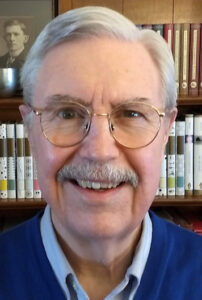
This is the cover to “Monastic Ecological Wisdom: A Living Tradition,” by Samuel Torvend. It is reviewed by Timothy Walch.
By Tim Walch
Book Review
A review of “Monastic Ecological Wisdom: A Living Tradition,” by Samuel Torvend. Liturgical Press, 160 pages, $21.95

In the first book of Genesis, God assigns to humankind “dominion over the fish of the sea, and the fowl of the air, and over the cattle, and over the earth, and over every creeping thing that creepeth upon the earth.”
The language from the “King James Bible” may be archaic, but the mandate is clear. We must care for the animals, plants, minerals and other resources so that we all can flourish on our precious planet.
That’s the message in “Monastic Ecological Wisdom.” The author, Samuel Torvend, is a professor emeritus of religion and a Benedictine oblate who draws on the New Testament, the Rule of St. Benedict, and the work of other monastic fathers to guide us on how to be good stewards of the earth.
Torvend also draws inspiration from the guidance in “Laudato Si,’” the 2015 papal encyclical on the fate of our environment. “Pope Francis,” he writes, “presented a pathway toward the future of environmental conservation and the healing of a wound inflicted on the earth since the onset of the Industrial Revolution.”
Most important in the encyclical is the emphasis on the care of the earth and its inhabitants as a spiritual practice for all Christians. Taking this point as his charge, Torvend examines the work and prayer being done at monastic communities around the world, particularly in the United States. He stresses the thoughtful stewardship of land, water, forests, buildings and diverse creatures. Monastic values can be found in the care of all these resources.
“Monastic Ecological Wisdom” begins by showing the strong connection between environmental history and Church tradition. Torvend notes how the first Christians were well aware of the ecological elements of their faith. Too often, this commitment has been overlooked by historians and theologians.
He then moves on to the life and works of St. Benedict. Torvend stresses the powerful sense of place in Benedict’s life and work. Prayer, of course, was a major element in Benedictine life and the natural seasons of the year guided the course and purpose of that prayer.
Work naturally flowed from prayer in Benedictine monasteries. Torvend uses the writings of other scholars to show the ecological dimensions of selected chapters in the Benedictine Rule. “Here we highlight the labor and careful stewardship of the land and water resources by early monastic communities,” he notes, “a labor frequently overlooked in environmental histories.”
The last two chapters are reflections on how we might apply these monastic values and how the call to action in “Laudato Si’” can be applied to our contemporary environmental challenges. Benedict and Francis offer us inspiration and guidance. The question is whether we will follow that advice.
Early praise for “Monastic Ecological Wisdom” underscores the value of the book. “It is a work that will surely encourage many, including me,” writes retiring Abbot John Klassen of St. John’s Abbey in Collegeville, Minnesota, “to harvest insights and to continue to respond to the needs of the poor and the environment.”
The Diocese of Davenport also has accepted the challenge and developed a “Laudato Si’” Action Plan to make our chancery operations carbon neutral by 2050. The plan is being led by Deacon Kent Ferris and is discussed at length in the Dec. 7, 2023 issue of The Catholic Messenger. The full report is available at: davenportdiocese.org/laudato-si-plan.
In his final paragraph, Torvend offers a beautiful commentary — almost a hymn — that sums up the paramount importance of ecological stewardship. “God’s home is here on earth,” he writes, “where a river flows pure and clean and the tree of life bears fruit for the healing of the nation, bears fruit for nothing less than the healing of the earth and its many creatures.”
Let’s do more to be the good stewards that are desperately necessary to preserve God’s great gift. St. Benedict and Pope Francis point the way.
(Timothy Walch is a parishioner at St. Thomas More Parish in Coralville, and a member of The Catholic Messenger Board of Directors. He regularly reviews books for The Messenger and other publications and is the author of many books including “Irish Iowa.”)











